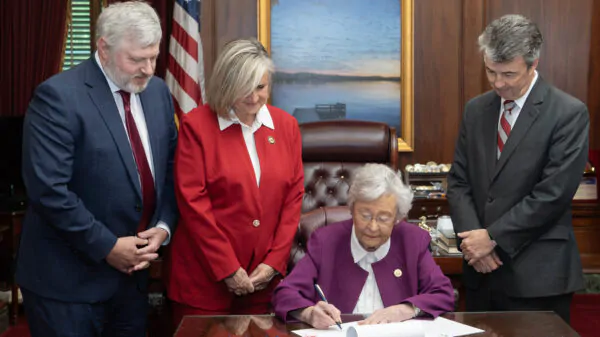Alabama Attorney General Steve Marshall announced Monday the first distribution of funds awarded to the state from its settlement with McKinsey & Company, one of the world’s top management-consulting firms, for its role in the opioid crisis in Alabama.
According to the Attorney General’s Office, $1.5 million was awarded to prosecutors to invest in Alabama’s drug court, veteran’s courts and mental health courts. The terms of the state’s settlement with McKinsey stipulate the funds are to be used “to remediate the harms caused to the State and its citizens by the opioid epidemic” and refund the state for expenses incurred in “investigating and pursuing its claims” against McKinsey.
“Investing in Alabama’s drug courts is directly responsive to the needs of individuals struggling with opioid addiction, but also to the significant strain that the opioid epidemic has placed on our District Attorneys’ offices and court systems across the state,” Marshall said in a statement Monday. “President Trump’s Commission on Combating Drug Addiction and the Opioid Crisis rightly recognized the role that drug courts can play in leading our state and country out of this epidemic and I am pleased to make a financial contribution to this end.”
In a statement Monday, President of the District Attorneys Association and Dallas County District Attorney Michael Jackson thanked Attorney General Marshall for his acknowledgment of the strain placed on prosecutorial offices during the opioid crisis.
“Drug courts and pretrial diversion programs are an extremely valuable tool—not only can this type of intervention save the lives of addicted offenders,” Jackson said. “These programs also help decrease victimization within communities–, We are grateful for our ongoing partnership with the Attorney General’s Office to make our state a safer place to live.”
In February, McKinsey & Company agreed to pay $574 million between 47 states, the District of Columbia, and five U.S territories, for the company’s role in consulting with pharmaceutical companies, including OxyContin manufacturer Purdue Pharma, to maximize profits and create aggressive marketing schemes for opioid products.
Alabama will receive a total of $9 million from McKinsey & Company — $7.6 million to be awarded this year, according to the Attorney General’s Office. Two other distributions from the McKinsey settlement funds are expected to be announced this week by the Attorney General’s Office.
According to the New York Times, Consultants from McKinsey advised Purdue Pharma how to “turbocharge” sales of OxyContin and how best to circumnavigate attempts from drug enforcement agents to reduce opioid use around the country.
According to the National Institute on Drug Abuse, nearly 50,000 people died in the United States from opioid-involved overdoses in 2019, the same year as the multi-state lawsuit.
In September, a report from the American Medical Association said the number of opioid prescriptions in Alabama had reduced by 38 percent since 2011, with dosage potency for prescribed opioids also falling by 47 percent.
Yet some 1,064 deaths related to drug overdoses have been reported by Alabama as of March 2021, according to the Centers for Disease Control and Prevention. Due to the lag in reporting, the CDC predicts the true number of overdose deaths in Alabama at 1,094 deaths.


















































